2012最新人教版七年级英语第六单元全单元课件 2
合集下载
2012最新人教版七年级英语第六单元全单元课件
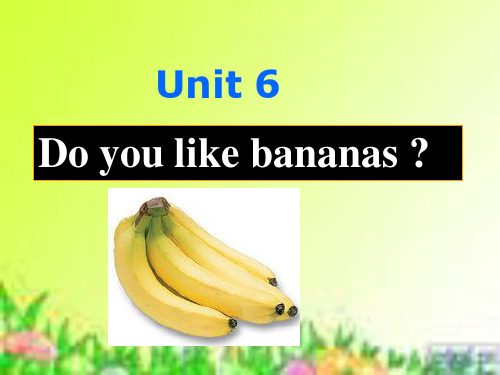
2a Listen and circle the food you hear. 听录音,圈出所听到的食物。
hamburgers pears
tomatoes
strawberries oranges ice-cream salad bananas
2b Listen again and fill in the blanks
以-s, -x, -sh, -ch 结尾的 以 f 或 fe 结尾的
加-es
改f或fe为v 再加-es
-es读[iz] -ves读[vz]
可数名词复数形式的构成 2
名词特点 词尾加法
词尾读音方法
例词
以辅音字母 改y为i 再 加y结尾的 加-es
以元音字母 加y结尾的
families -ies读[iz] dictionaries -s读[z]
Profile
Name: Liu Xiang Job: runner
running star
He eats lots of healthy food.
Read and fill in the blanks as quickly as you can.
Profile
Name: Cindy Smith Job:
3
4
7
10
6
1 8
2
9
5 breakfast
lunch
dinner
1b
How many other words can you Add to the lists.
fruit : ________________________________
_________________________________ vegetables: __________________________________
新人教版七年级下册英语 Unit 6 第2课时 教学课件
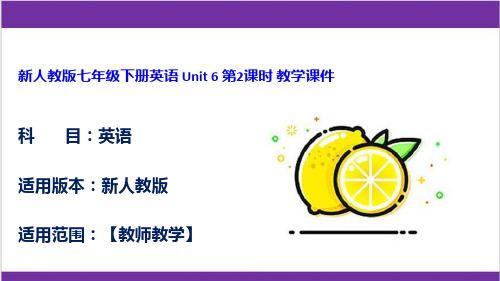
5 Do you want to go tomorrow then?
8 OK. See you tomorrow evening! 2 I’m reading a book. 7 Let’s go at seven o’clock. 4 No, this book is really interesting. 1 What are you doing?
She is drinking.
第十页,共二十一页。
新课讲解
T: What is he doing? S1: Is he…? S2: Is he…?
…
He is running.
第十一页,共二十一页。
新课讲解
T: What are they doing? S1: Are they…? S2: Are they…?
1. Jenny/clean the house/now
_Je_n_n_y_i_s_c_le_a_n_in_g__th_e_h_o_u_s_e_n_o_w_._________________
2. Bob/make dinner/every Saturday
_B_o_b__m_a_k_e_s_d_i_n_n_e_r _e_v_e_ry__S_a_tu_r_d_a_y_. _____________ 3. Mary’s parents/ drink tea/ after dinner
—I ___a_m_e_a_t_in_g__(eat) bread.
第十九页,共二十一页。
当堂小练 用动词的适当形式填空 1. Look! The boys____a_r_e_p_l_ay_i_n_g__ (play) basketball. 2. My father ______r_ea_d_s___ (read) books after dinner. 3. In the morning, Mr Smith _______g_e_t_s_(get) up at seven o’clock. 4. Listen! Linda ______________(sing) in the next room. 5. His brother usuallyis__si_n_g_in_g______(do) homework at school. 6. They _____________(go) shdopepsing every Friday evening. 7. A: What’s he dgooing now? B: He _____________ (work). 8. Her sister _______________(eat) dinnerisnwowor.king 9. She often ______i_s_e_a_ti_n_g(wash) the dishes in the evening. 10.On weekends Jewnansyhe_s____________(walk) with her pet dog.
8 OK. See you tomorrow evening! 2 I’m reading a book. 7 Let’s go at seven o’clock. 4 No, this book is really interesting. 1 What are you doing?
She is drinking.
第十页,共二十一页。
新课讲解
T: What is he doing? S1: Is he…? S2: Is he…?
…
He is running.
第十一页,共二十一页。
新课讲解
T: What are they doing? S1: Are they…? S2: Are they…?
1. Jenny/clean the house/now
_Je_n_n_y_i_s_c_le_a_n_in_g__th_e_h_o_u_s_e_n_o_w_._________________
2. Bob/make dinner/every Saturday
_B_o_b__m_a_k_e_s_d_i_n_n_e_r _e_v_e_ry__S_a_tu_r_d_a_y_. _____________ 3. Mary’s parents/ drink tea/ after dinner
—I ___a_m_e_a_t_in_g__(eat) bread.
第十九页,共二十一页。
当堂小练 用动词的适当形式填空 1. Look! The boys____a_r_e_p_l_ay_i_n_g__ (play) basketball. 2. My father ______r_ea_d_s___ (read) books after dinner. 3. In the morning, Mr Smith _______g_e_t_s_(get) up at seven o’clock. 4. Listen! Linda ______________(sing) in the next room. 5. His brother usuallyis__si_n_g_in_g______(do) homework at school. 6. They _____________(go) shdopepsing every Friday evening. 7. A: What’s he dgooing now? B: He _____________ (work). 8. Her sister _______________(eat) dinnerisnwowor.king 9. She often ______i_s_e_a_ti_n_g(wash) the dishes in the evening. 10.On weekends Jewnansyhe_s____________(walk) with her pet dog.
人教七年级英语上册Unit 6 Section B2 课件(共25张PPT)

Read the magazine article to find out Cindy’s eating habits.
To learn to write about your eating habits.
What do you like for breakfast, lunch and supper?
谢谢观赏
You made my day!
我们,还在路上……
2. volleyball 排球 volleyballer 排球运动员 后缀-er一般用来表示人。
e.g. work (工作) --- worker(工人) sing(唱歌) --- singer(歌手) teach (教) --- teacher(教师) run (跑) ---runner(跑步的人)
Unit 6 Do you like bananas?
七年级(上)
Read the words and expressions aloud.
Words and expressions
star 明星;星星 eat 吃 well 好;令人满意地 habit 习惯 healthy 健康的 really 真正地 question 问题 want 需要;想要 be 变成 fat 肥的;肥胖的
3. I like chicken for dinner. 晚餐我喜欢吃鸡肉。
1) for dinner在句中作状语。 2) have /has也可以表示 “吃”或 “喝”。
英语中人们习惯用have来表示吃早、 中、晚饭。而不用eat来表示, 且三餐 前不加定冠词the。 e.g. Let’s have lunch. 我们吃午饭吧。
Let’s have some salad. 让我们吃些沙拉吧。
人教版七年级英语上册第六单元全单元 ppt课件

喜欢
Yes,I do.
Do you like salad? No,I don’t.
Do you like oranges?
Yes,I do.
2020/10/22
人教版七年级英语上册第六单元全
21
单元
1b Listen and number the conversations [1-3]. 听录音,给对话编号。
Unit 6
Do you like bananas ?
2020/10/22
人教版七年级英语上册第六单元全
1
单元
Period 1
2020/10/22
人教版七年级英语上册第六单元全
2
单元
精品资料
soccer ball
足球(英式)
2020/10/22
人教版七年级英语上册第六单元全
4
单元
a strawberry
ice cream
oranges bananas strawberries
eggs
apples vegetables carrots pears
milk bread tea
meat
salad chicken
2020/10/22
人教版七年级英语上册第六单元全
19
单元
1a 将词语与图中物品匹配。
1. hamburgers d
人教版七年级英语上册第六单元全
14
单元
milk
2020/10/22
uncountable nouns不可数名词
tea
meat
water
人教版七年级英语上册第六单元全
15
单元
可数名词和不可数名词
Yes,I do.
Do you like salad? No,I don’t.
Do you like oranges?
Yes,I do.
2020/10/22
人教版七年级英语上册第六单元全
21
单元
1b Listen and number the conversations [1-3]. 听录音,给对话编号。
Unit 6
Do you like bananas ?
2020/10/22
人教版七年级英语上册第六单元全
1
单元
Period 1
2020/10/22
人教版七年级英语上册第六单元全
2
单元
精品资料
soccer ball
足球(英式)
2020/10/22
人教版七年级英语上册第六单元全
4
单元
a strawberry
ice cream
oranges bananas strawberries
eggs
apples vegetables carrots pears
milk bread tea
meat
salad chicken
2020/10/22
人教版七年级英语上册第六单元全
19
单元
1a 将词语与图中物品匹配。
1. hamburgers d
人教版七年级英语上册第六单元全
14
单元
milk
2020/10/22
uncountable nouns不可数名词
tea
meat
water
人教版七年级英语上册第六单元全
15
单元
可数名词和不可数名词
新人教版七年级英语下册 Unit6 Section A 2-课件.ppt

+… 我正在洗衣服。_I’_m__w__a_s_h_in_g__th__e_c_lo_t_h_e_s_. ___ 他正在打电话。 H__e_i_s_t_a_lk__in_g__o_n_t_h_e_p__h_o_n_e_. ____ 他们没在下象棋。_T_h_e_y__a_r_e_n_o_t_p_l_a_y_i_n_g_c_h_e_ss. 彼特没在打篮球。_P_e_te_r__is_n_’_t _p_l_a_y_in_g__b_a_s_k_e_tb_a_l_l.
3. Mary’s parents/drink tea/after dinner __M__a_r_y_’s__p_a_r_e_n_ts__d_r_in_k__t_e_a_a_f_te_r__d_in_n_e_r_.__ 4. Bill/talk on the phone/now __B_i_ll_i_s_t_a_lk_i_n_g__o_n_t_h_e_p_h__o_n_e_n_o_w__. _______ 5. Susan and Bob/watch TV/on weekends __B_e_c_k_y_a_n__d_B__o_b_w__a_tc_h__T_V__o_n__w_e_e_k_e_n_d_s_. _
2. 一般疑问句: Be (Am, Is, Are) + 主语 + V.-ing … 她正在弹钢琴吗?_I_s_s_h_e__p_la_y_i_n_g_t_h_e__p_ia_n_o_?__ 你们正在做作业吗?
_A_r_e_y_o_u__d_o_i_n_g_y_o_u_r__h_o_m__ew__o_r_k_?__ 3. 特殊疑问句 特殊疑问词+ be (am, is, are) +主语+ V. –ing… 杰克正做什么事情? W__h_a_t_i_s_J_a_c_k__d_o_in__g_?_ 他们正在做什么事情? _W__h_a_t_a_r_e_t_h_e_y__d_o_in_g_?__
3. Mary’s parents/drink tea/after dinner __M__a_r_y_’s__p_a_r_e_n_ts__d_r_in_k__t_e_a_a_f_te_r__d_in_n_e_r_.__ 4. Bill/talk on the phone/now __B_i_ll_i_s_t_a_lk_i_n_g__o_n_t_h_e_p_h__o_n_e_n_o_w__. _______ 5. Susan and Bob/watch TV/on weekends __B_e_c_k_y_a_n__d_B__o_b_w__a_tc_h__T_V__o_n__w_e_e_k_e_n_d_s_. _
2. 一般疑问句: Be (Am, Is, Are) + 主语 + V.-ing … 她正在弹钢琴吗?_I_s_s_h_e__p_la_y_i_n_g_t_h_e__p_ia_n_o_?__ 你们正在做作业吗?
_A_r_e_y_o_u__d_o_i_n_g_y_o_u_r__h_o_m__ew__o_r_k_?__ 3. 特殊疑问句 特殊疑问词+ be (am, is, are) +主语+ V. –ing… 杰克正做什么事情? W__h_a_t_i_s_J_a_c_k__d_o_in__g_?_ 他们正在做什么事情? _W__h_a_t_a_r_e_t_h_e_y__d_o_in_g_?__
新人教版英语七年级上册Unit 6 课时2 Section A(2a-2e)同步课件

2c Read again and complete Tom’s school day routine. routine n. 日程
7:10 a.m. 5:00 p.m. 6:30 p.m. 9:30 p.m.
get up go to school play basketball do homework
brush(es )teeth take(s) a shower eat(s) breakfast go(es) to school
get(s) up
get(s) dressed
Report: I usually get up at... My partner usually/always gets up at…
2b Read the conversation and answer the questions.
stay v. 停留
He can play the guitar.
1. She asks him about his schedule. 2. For about 9 hours. 3. Because he wants to get up early.
1. Who are they?
They are Lu Jiaqi and Tom.
2. Where are they?
They are next to a playground.
3. What are they talking about?
Maybe they are talking about how to spend a day at school.
音标抢答
[pɒt]
[zɪp]
[dɔ:]
拼
读
[si:k]
最新人教版七年级上Unit6全单元课件
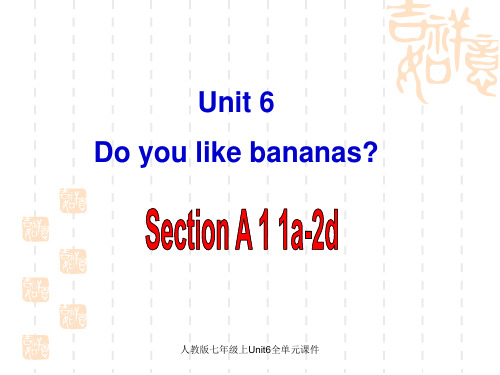
2 A: Do you like salad? B: No, I don’t. A: Do you like bananas?
1 B: Yes, I do. A: Do you like oranges?
3 B: Yes, I do.
人教版七年级上Unit6全单元课件
1c Practice the conversations above with your partner. Then make your own conversations.
Bill: Sounds good. John likes hamburgers.
Jack: Oh, I don’t like salad. Bill: But John likes salad,
and it’s his birthday. Jack: Yes, you’re right.
What about the fruit? Tom: I think John likes strawberries and apples. Bill: OK. Let’s have strawberries and apples then.
人教版七年级上Unit6全单元课件
2d Role-play the conversation.
Jack: Hey, John’s birth day dinner is next week. Let’s think about the food.
Tom: Sure. How about burgers, vegetable salad, and some fruit?
strawberry --- strawberries
rice
tomato ---- tomatoes
1 B: Yes, I do. A: Do you like oranges?
3 B: Yes, I do.
人教版七年级上Unit6全单元课件
1c Practice the conversations above with your partner. Then make your own conversations.
Bill: Sounds good. John likes hamburgers.
Jack: Oh, I don’t like salad. Bill: But John likes salad,
and it’s his birthday. Jack: Yes, you’re right.
What about the fruit? Tom: I think John likes strawberries and apples. Bill: OK. Let’s have strawberries and apples then.
人教版七年级上Unit6全单元课件
2d Role-play the conversation.
Jack: Hey, John’s birth day dinner is next week. Let’s think about the food.
Tom: Sure. How about burgers, vegetable salad, and some fruit?
strawberry --- strawberries
rice
tomato ---- tomatoes
人教版七年级英语下册Unit 6 Section A2优质课件
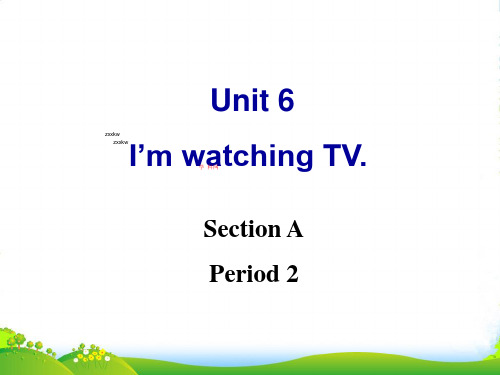
3. 现在进行时由be(am/is/are)+动词-ing形式构成。 肯定式结构: 主语+be+动词-ing形式+其他. 否定式结构: 主语+be+not+动词-ing形式+其他. 一般疑问句结构: Be+主语+动词-ing形式+其他? 特殊疑问句结构: 疑问词+be+主语+其他?
肯定式:1. I am singing. 2. She is dancing. 3. He is listening. 4. They are watching TV.
词 come
变 arrive 变 变 dance
leave
writing taking having
making coming arriving dancing leaving
动 sit
词 shop
现 cut
在 stop
分 词
put
变 get
变 begin
变 swim
run
sitting shopping cutting stopping putting getting beginning swimming running
What are they doing? They are running.
What is it doing?
It is listening to the radio.
现在进行时 (The Present Continuous Tense)
1. a.现在进行时态表示现在 (说话瞬间) 正在进行 或发生的动作。如: The students are listening to the teacher. He is watching TV now. b.现在进行时态还可以表示当前一段时间内的活动 动或现阶段正在进行的动作。如: We are working on a farm these days . I am writing a book this month.
人教版七年级英语下册教学课件《Unit 6 Section A 2a-2d》

Hello? This is Bob. Who’s that? 喂?我是鲍勃,你是谁?
Hi, Bob. It’s Mike here. 你好,鲍勃。我是迈克。
2. Not much. (口语)没什么大事。 也可说成,nothing much 例如: A: What are you doing, Linda? 你在做什么事,琳达?
can you _s_e_e__? 5. Don’t _r_e_a_d___ the newspaper when you walk.
Ⅳ. 翻译句子。
1. - 她正在干什么? - 她正在看电视。
- What is she doing? - She’s watching TV. 2. – Nancy 正在做她的作业吗? - 不,她没有。她正在写信。 -Is Nancy doing her homework? -No, she isn’t. She’s writing a letter.
3. 他们正在和谁谈话? Who are they talking to?
4. 那听起来是个好主意. That sounds a good idea.
5. 我正在给我的朋友写信。 I’m writing a letter to my friend.
➢ 中考链接
— China’s high-speed railway technology
Do you want toj_o_in__ us _f_o_r_ dinner? 5. 明天晚上见!
_S_e_e_ _y_o_u__ tomorrow evening!
Ⅱ.用所给动词的适当形式填空。 1. It’s 7:20. Jane and her father _a_r_e__w_a_l_k_i_n_g__ (walk) in the park. 2. Look! The girl _is__p_l_a_y_in_g___(play) the piano. 3. _I_s__ Ben __w_r_i_t_in_g__(write) a letter now? 4. The man _is__b_u_y__in_g___(buy) some vegetables in the store. 5. My parents _a_r_e__h_a_v_i_n_g_(have) breakfast now.
Hi, Bob. It’s Mike here. 你好,鲍勃。我是迈克。
2. Not much. (口语)没什么大事。 也可说成,nothing much 例如: A: What are you doing, Linda? 你在做什么事,琳达?
can you _s_e_e__? 5. Don’t _r_e_a_d___ the newspaper when you walk.
Ⅳ. 翻译句子。
1. - 她正在干什么? - 她正在看电视。
- What is she doing? - She’s watching TV. 2. – Nancy 正在做她的作业吗? - 不,她没有。她正在写信。 -Is Nancy doing her homework? -No, she isn’t. She’s writing a letter.
3. 他们正在和谁谈话? Who are they talking to?
4. 那听起来是个好主意. That sounds a good idea.
5. 我正在给我的朋友写信。 I’m writing a letter to my friend.
➢ 中考链接
— China’s high-speed railway technology
Do you want toj_o_in__ us _f_o_r_ dinner? 5. 明天晚上见!
_S_e_e_ _y_o_u__ tomorrow evening!
Ⅱ.用所给动词的适当形式填空。 1. It’s 7:20. Jane and her father _a_r_e__w_a_l_k_i_n_g__ (walk) in the park. 2. Look! The girl _is__p_l_a_y_in_g___(play) the piano. 3. _I_s__ Ben __w_r_i_t_in_g__(write) a letter now? 4. The man _is__b_u_y__in_g___(buy) some vegetables in the store. 5. My parents _a_r_e__h_a_v_i_n_g_(have) breakfast now.
人教版英语初一年级七年级上册 Unit 6 Section A 2a-2d 【教学课件PPT】

Jack: Oh, I don’t like salad. Bill: But John likes salad, and it’s his birthday.
Jack: Yes, you’re right. What about the fruit? Tom: I think John likes strawberries and
4. Let’s have strawberries and apples then. “Let’s have…”译为“让我们吃……” 1) 在英语中“have”+表示一日三餐名词,意为“ 用餐”。
have breakfast/lunch/supper 吃早饭/午饭/晚饭 have dinner 吃晚饭
2)have+表示食品、饮料等名词, 意为“吃;喝” (=eat, drink)。如: have (some) bread 吃面包 have eggs (for breakfast) (早餐)吃鸡蛋 have (a cup of )tea 喝(一杯)茶
Exercises
I. 根据图片提示完成句子。
3. How about...?意为“……怎么样?” 相当于What about...?,用来询问情况或征求意见。 如:How about/What about eating salad?
吃沙拉怎么样? My father is a teacher. What about yours? 我父亲是位老师,你父亲呢?
next year 明年
last year 去年
2. Let’s think about the food. 让我们来想想(吃什么)食物吧。
“think about”表示“思考;考虑”, “think” 为不及物动词,常与介词 about连用 。例如: Let me think about your house.
人教版七年级英语上册第六单元全单元课件

• want
需要,想要
• be
变成
• fat
肥的,肥胖的
1a Write the number of each word
next to the correct food. 1.orange 3.eggs 5.ice-cream 7.banana 9.rice 2.salad 4.apple 6.hamburger 8.chicken 10.carrots
• burger 汉堡包
• Vegetable 蔬菜
• fruit
水果
2d • Role-play the conversation.分角色表演对话。
Jack: Hey, John’s birthday dinner is next week. Let’s think about the food. Tom: Sure. How about burgers, vegetable salad, and some fruits? Bill: Sounds good. John likes hamburgers. Jack : Oh, I don’t like salad. Bill: John likes salad, and it’s his birthday. Jack : Yes, you’re right. What about the fruit? Tom : I think John likes strawberries and apples.
2a Listen and circle the food you hear. 听录音,圈出所听到的食物。
hamburgers pears tomatoes
strawberries oranges ice-cream
1人教版英语七年级上册Unit 6 Section A 2a-2dPPT下载
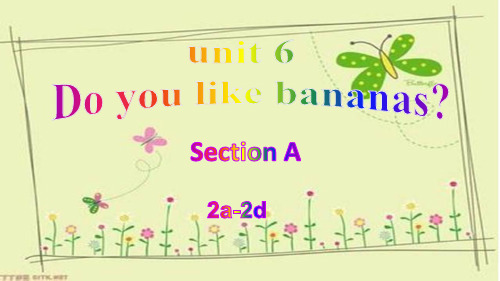
1人教版英语七年级上册Unit 6 Section A 2a-2dPPT下载
1人教版英语七年级上册Unit 6 Section A 2a-2dPPT下载
你需要帮助吗?我们来讨论一下吧!
Li Rui Sun Hua YOU
salad √
√ ×
tomatoes √ √ √
apples √ √ √
提示: 1.Next week is … 2.Let’s think about … 3. How about …? 4. I don’t like … 5. Li Rui likes .. 6. Let’s have …
right 15.Yes,you are _______(正确的).
1人教版英语七年级上册Unit 6 Section A 2a-2dPPT下载
1人教版英语七年级上册Unit 6 Section A 2a-2dPPT下载
四、单项选择。
16.I like _B___. A.tomato and salad
hamburgers pears tomatoes strawberries oranges ice-cream salad bananas
2b Listen again and fill in the blanks.
1人教版英语七年级上册Unit 6 Section A 2a-2dPPT下载
2b Listen again and fill in the blanks.
. 3.So what do they decide to prepare for John’s
birthday dinner ? They decide to prepare hamburgers, salad ,
新人教版英语七年级下册《Unit 6 Section A 2a-2d》课件

Warming up
-What is he doing? -He is reading a newspaper.
read a newspaper
-What is she doing? -She is making soup.
make soup
What are they doing? They are watching TV.
Let’s guess what they are doing.
Is Nancy doing homework? No, she isn’t. She’s writing a letter.
Is Tom doing homework?
No, he isn’t. He’s drawing.
ห้องสมุดไป่ตู้
1. This is Jenny. 我是詹妮。 这是打电话用语。当打电话时,介绍自己 时用“This is…”或“It’s…”;问对方 用“Is that…?”或“Who’s that?”例如:
2a Listen and answer these questions.
1. What is Steve doing? He is watching TV.
2. What is Jack doing? He is listening to a CD.
2b Listen again. Fill in the blanks.
Hello? This is Bob. Who’s that? 喂?我是鲍勃,你是谁?
Hi, Bob. It’s Mike here. 你好,鲍勃。我是迈克。
2. Not much. (口语)没什么大事。 也可说成,nothing much 例如: A: What are you doing, Linda? 你在做什么事,琳达?
Unit6SectionA(2a-2d)课件人教版英语七年级下册

进行的动作。例如: 这些天来,我们在做一架模型飞机。 We are _m___a_k_i_n_g__a__m___o_d__e_l_p__la__n_e______ these days.
ቤተ መጻሕፍቲ ባይዱ
二、结构: 由助动词be (am/is/are)+动词的ing 形式,动词的ing 形 式叫做现在分词。
三、常用时间状语: now, these days或表示现在情景的look, listen,等。
Mary's parents drink tea after dinner.玛丽的父母饭后会喝茶。 (1)drink 作及物动词,意为 “喝,饮”。 如:Would you like to drink a cup of coffee?你想要喝杯咖啡吗? drink 还可作名词,意为“饮料”,一般情况下为不可数名词, 但当指饮料的种类或份数时为可数名词。 如:There are all kinds of drinks in the shop. 这个商店有各种各样的饮料。 (2)tea不可数名词,意为“茶,茶叶”。 如:He always drinks a cup of tea in the morning. 他每天早上都会喝一杯茶。
D. read;is watching
This is Jenny. 我是詹妮
这是打电话用语。 当打电话时,介绍自己时用 “This is …” 或 “It's …”; 询问对方用“Is that…?”或 “Who's that?”。 如: — Hello? This is Sam,who's that? 喂?我是山姆,你是谁? — Hi,Sam. It's Bob here. 你好,山姆。我是鲍勃。
例句
ቤተ መጻሕፍቲ ባይዱ
二、结构: 由助动词be (am/is/are)+动词的ing 形式,动词的ing 形 式叫做现在分词。
三、常用时间状语: now, these days或表示现在情景的look, listen,等。
Mary's parents drink tea after dinner.玛丽的父母饭后会喝茶。 (1)drink 作及物动词,意为 “喝,饮”。 如:Would you like to drink a cup of coffee?你想要喝杯咖啡吗? drink 还可作名词,意为“饮料”,一般情况下为不可数名词, 但当指饮料的种类或份数时为可数名词。 如:There are all kinds of drinks in the shop. 这个商店有各种各样的饮料。 (2)tea不可数名词,意为“茶,茶叶”。 如:He always drinks a cup of tea in the morning. 他每天早上都会喝一杯茶。
D. read;is watching
This is Jenny. 我是詹妮
这是打电话用语。 当打电话时,介绍自己时用 “This is …” 或 “It's …”; 询问对方用“Is that…?”或 “Who's that?”。 如: — Hello? This is Sam,who's that? 喂?我是山姆,你是谁? — Hi,Sam. It's Bob here. 你好,山姆。我是鲍勃。
例句
【最新】人教版七年级英语下册Unit6 period2精品课件.ppt

Peter isn’t playing basketball.
2. 一般疑问句:
Be (Am, Is, Are) + 主语 + V.-ing …
她正在弹钢琴吗?__I_s__s_h_e__p_l_a_y_i_n_g__t_h_e__p_i_ano?
你们正在做作业吗?
A_r_e__y_o_u__d_o_i_n_g__y_o_u_r__h_o_m_e_w_o_r_k_?__ 3. 特殊疑问句
4. I'd love to. 我很乐意。 1) 交际用语,用于礼貌地接受他人邀
请,还可以说成I’d like to, 但语气比 较弱。
2) 当委婉拒绝他人邀请时,多用I’d love to, but...或Sorry, I’m afraid I can't beca示现在(说话瞬间)正在进行或 发生的动作。例如: 我正在做作业。I’m _d_o_i_n_g my homework now. 他们在操场上踢足球。 They’re p_l_a_y_i_n_g_ soccer on the playground. 2. 也可表示当前一段时间内的活动或现阶段正在 进行的动作。例如: 这些天来,我们在做一架模型飞机。 We are m_a_k_i_n_g__a__m_o_d_e_l__p_l_a_n_e_ these days.
_M_r_.__G_r_e_e_n__i_s__w_r_i_t_i_n_g__a__s_t_o_r_y__now. 看!他们正在吃早饭。 _L_o_o_k_!__T_h_e_y_’__r_e__e_a_t_i_n_g__b_r_e_a_k_f_a_s_t.
1.你在做什么? W_h_a_t__a_r_e__y_o_u__d_o_i_n_g_?___ 2.我在看电视。 _I_’__m__w_a_t_c_h_i_n_g__T_V_._ 3.她在做什么? _W_h_a_t_’__s__s_h_e__d_o_i_n_g_?_ 4.她在洗衣服。 S_h_e_’__s__w_a_s_h_i_n_g__h_e_r__c_lothes. 5.他们在做什么?__W_h_a_t__a_r_e__t_h_e_y__d_o_i_ng? 6.他们在听CD。 __T_h_e_y_’__r_e__l_i_s_t_e_n_i_n_g__t_o__a__CD. 7.你在做作业吗?__A_r_e__y_o_u__d_o_i_n_g__y_o_u_r__h_o_m_e_w_ork? 8.是的。/ 不是。 __Y_e_s_,__I__a_m_.__/__N_o_,__I_’__m__n_o_t.
2. 一般疑问句:
Be (Am, Is, Are) + 主语 + V.-ing …
她正在弹钢琴吗?__I_s__s_h_e__p_l_a_y_i_n_g__t_h_e__p_i_ano?
你们正在做作业吗?
A_r_e__y_o_u__d_o_i_n_g__y_o_u_r__h_o_m_e_w_o_r_k_?__ 3. 特殊疑问句
4. I'd love to. 我很乐意。 1) 交际用语,用于礼貌地接受他人邀
请,还可以说成I’d like to, 但语气比 较弱。
2) 当委婉拒绝他人邀请时,多用I’d love to, but...或Sorry, I’m afraid I can't beca示现在(说话瞬间)正在进行或 发生的动作。例如: 我正在做作业。I’m _d_o_i_n_g my homework now. 他们在操场上踢足球。 They’re p_l_a_y_i_n_g_ soccer on the playground. 2. 也可表示当前一段时间内的活动或现阶段正在 进行的动作。例如: 这些天来,我们在做一架模型飞机。 We are m_a_k_i_n_g__a__m_o_d_e_l__p_l_a_n_e_ these days.
_M_r_.__G_r_e_e_n__i_s__w_r_i_t_i_n_g__a__s_t_o_r_y__now. 看!他们正在吃早饭。 _L_o_o_k_!__T_h_e_y_’__r_e__e_a_t_i_n_g__b_r_e_a_k_f_a_s_t.
1.你在做什么? W_h_a_t__a_r_e__y_o_u__d_o_i_n_g_?___ 2.我在看电视。 _I_’__m__w_a_t_c_h_i_n_g__T_V_._ 3.她在做什么? _W_h_a_t_’__s__s_h_e__d_o_i_n_g_?_ 4.她在洗衣服。 S_h_e_’__s__w_a_s_h_i_n_g__h_e_r__c_lothes. 5.他们在做什么?__W_h_a_t__a_r_e__t_h_e_y__d_o_i_ng? 6.他们在听CD。 __T_h_e_y_’__r_e__l_i_s_t_e_n_i_n_g__t_o__a__CD. 7.你在做作业吗?__A_r_e__y_o_u__d_o_i_n_g__y_o_u_r__h_o_m_e_w_ork? 8.是的。/ 不是。 __Y_e_s_,__I__a_m_.__/__N_o_,__I_’__m__n_o_t.
新编版人教版七年级英语上册第六单元全单元课件

2 A: Do you like salad? B: No, I don’t.
A: D1 o you like bananas? B: Yes, I do.
3 A: Do you like oranges? B: Yes, I do.
1c
编新对话
Do you like…?
Yes, I do. / No, I don’t.
例词
families dictionaries
boys keys
tomatoes potatoes
photos radios
Plural Forms
Countable nouns可数名词
hamburgers, bananas oranges, pears, tomatoes, strawberries
Yes , they do .
No , they don’t .
Grammar Focus 2
Does _s_h_e__ like tomatoes ?
Yes , she does . No , she doesn’t .
Grammar Focus 3
I like _o_r_a_n__g_e_s__ . I don’t like _b_a_n_a_n_a_s__ .
2a Listen and circle the food you hear. 听录音,圈出所听到的食物。
hamburgers pears tomatoes
Байду номын сангаас
strawberries oranges ice-cream
salad
bananas
2b Listen again and fill in the blanks
A: D1 o you like bananas? B: Yes, I do.
3 A: Do you like oranges? B: Yes, I do.
1c
编新对话
Do you like…?
Yes, I do. / No, I don’t.
例词
families dictionaries
boys keys
tomatoes potatoes
photos radios
Plural Forms
Countable nouns可数名词
hamburgers, bananas oranges, pears, tomatoes, strawberries
Yes , they do .
No , they don’t .
Grammar Focus 2
Does _s_h_e__ like tomatoes ?
Yes , she does . No , she doesn’t .
Grammar Focus 3
I like _o_r_a_n__g_e_s__ . I don’t like _b_a_n_a_n_a_s__ .
2a Listen and circle the food you hear. 听录音,圈出所听到的食物。
hamburgers pears tomatoes
Байду номын сангаас
strawberries oranges ice-cream
salad
bananas
2b Listen again and fill in the blanks
新人教版七年级英语下册Unit6 SectionA(2a-2d)精品课件.ppt

10、人的志向通常和他们的能力成正比例。2021/1/142021/1/142021/1/141/14/2021 8:19:03 AM 11、夫学须志也,才须学也,非学无以广才,非志无以成学。2021/1/142021/1/142021/1/14Jan-2114-Jan-21 12、越是无能的人,越喜欢挑剔别人的错儿。2021/1/142021/1/142021/1/14Thursday, January 14, 2021 13、志不立,天下无可成之事。2021/1/142021/1/142021/1/142021/1/141/14/2021
• 14、Thank you very much for taking me with you on that splendid outing to London. It was the first time that I had seen the Tower or any of the other famous sights. If I'd gone alone, I couldn't have seen nearly as much, because I wouldn't have known my way about.
2c
Role-play the conversation in 2b.
2d Role-play the conversation.
This is...
It's... here.
I'm just ...
Do you want to... I'd love to.
Let's meet at...
Come at...
CD.
2b Listen again.
• 14、Thank you very much for taking me with you on that splendid outing to London. It was the first time that I had seen the Tower or any of the other famous sights. If I'd gone alone, I couldn't have seen nearly as much, because I wouldn't have known my way about.
2c
Role-play the conversation in 2b.
2d Role-play the conversation.
This is...
It's... here.
I'm just ...
Do you want to... I'd love to.
Let's meet at...
Come at...
CD.
2b Listen again.
相关主题
- 1、下载文档前请自行甄别文档内容的完整性,平台不提供额外的编辑、内容补充、找答案等附加服务。
- 2、"仅部分预览"的文档,不可在线预览部分如存在完整性等问题,可反馈申请退款(可完整预览的文档不适用该条件!)。
- 3、如文档侵犯您的权益,请联系客服反馈,我们会尽快为您处理(人工客服工作时间:9:00-18:30)。
tomatoes
ice cream
ice cream
tomatoes
2c
• 用2b 中的句型编新对话,谈自 己的真实情况。
A: I like bananas/ice cream…Do you like bananas/ice cream..?
B: Yes, I do. A,B:let’s have (吃)bananas/ice cream…
可数名词和不可数名词 既可数又不可数名词 定义:在某些情况下能计数,在某些情况下 不能计数的名词。 e.g. (1)a chicken 一只鸡 chicken 鸡肉
(2)an ice cream 一个冰淇淋 ice cream 冰淇淋(指成份) (3)a salad 一碟沙拉 salad 沙拉(指成份)
加-s
有生命的事 物加-es 无生命的事 物加-s
以o 结尾的
Plural Forms Countable nouns hamburgers, bananas oranges, pears, tomatoes, strawberries
uncountable nouns
tea milk
meat
water
1b Listen and number the conversations [1-3]. 听录音,给对话编号。
2 1 3
A: Do you like salad? B: No, I don’t. A: Do you like bananas? B: Yes, I do.
A: Do you like oranges? B: Yes, I do.
Tom : I think John likes strawberries and apples.
Bill: OK. Let’s have strawberries and apples then.
Grammar Focus 1
you Do _____ like salad ? Yes , I do . No , I don’t . they Do _____ like pears ? Yes , they do .
No , they don’t .
Grammar Focus 2
she Does _____ like tomatoes ?
Yes , she does . No , she doesn’t .
Grammar Focus 3
oranges I like __________ . bananas I don’t like _________ .
• • • • Does Tom like …? Yes, he does./ No, he doesn’t. Does Sally like …? Yes, she does./ No, she doesn’t.
2a
Food Fruit Vegetables Eggs Chicken Hamburgers Yes 0
6
1 8
2
9
5 breakfast
lunch
dinner
1b
How many other words can you Add to the lists.
fruit : ________________________________
_________________________________ vegetables: __________________________________
Countable nouns 可数名词 hamburgers tomatoes French fries oranges bananas strawberries eggs apples vegetables carrots pears Uncountable nouns 不可数名词 Countable and Uncountable nouns 可数/不可数 均可
noon
1a
Write the number of each word
next to the correct food. 1.orange 3.eggs 5.ice-cream 7.banana 9.rice 2.salad 4.apple 6.hamburger 8.chicken 10.carrots
2 1 3
A: Do you like salad? B: No, I don’t. A: Do you like bananas? B: Yes, I do.
A: Do you like oranges? B: Yes, I do.
1c
编新对话
Do you like…?
Yes, I do.
/ No, I don’t.
Unit 6
Do you like bananas ?
Period 1
a banana
a hamburger
bananas
hamburgers
a tomato
ice cream
tomatoes
salad
a strawberry
a pear
strawberries
pears
milk
an orange
bread
oranges
bananas
Do you like bananas?
√
Yes, I do.
oranges Do you like oranges?
√
Yes, I do.
salad
×
Do you like salad?
No, I don’t.
Let’s practice!
Do you like 复数n或不可数n?
hamburgers tomatoes French fries oranges bananas tea strawberries bread apples carrots pears broccoli meat water milk eggs ice cream salad chicken vegetables
rice
food
vegetables
chicken
fruits
可数名词和不可数名词 可数名词 定义:是可以计数的名词。 (1) 可数名词前可以用 a , an 限定,表一个….。 (2) 可数名词前可以用 one, two , three… 限定。 (3) (4) 可数名词有复数形式。
可数名词复数形式的构成 1
1b
Do you like bananas?
Yes,I do.
喜欢
Do you like salad?
No,I don’t. Do you like oranges?
Yes,I do.
1b Listen and number the conversations [1-3]. 听录音,给对话编号。
broccoli
water milk
ice cream
salad chicken
bread
tea meat
1a 将词语与图中物品匹配。 1. hamburgers d ? 2. tomatoes ? 3. oranges 4. ice-cream ? ? 5. salad ? 6. bananas 7. strawberries ? ? 8. pears 9. milk ? 10.bread ?
1c Listen and circle the food you hear in1a.
rice salad ice-cream eggs hamburger carrots
apple banana chicken
orange
1d Listen again. Fill in the chart..
Likes Doesn’t like
Sally
salad, apples, bananas, orange, ice-cream carrots,
vegetables
Tom
apples
1e Ask and answer questions
about what Sally and Tom like and don’t like.
Yes, I do.
No, I don’t.
1a 将词语与图中物品匹配。 1. hamburgers d ? 2. tomatoes ? 3. oranges 4. ice-cream ? ? 5. salad ? 6. bananas 7. strawberries ? ? 8. pears 9. milk ? 10.bread ?
名词特点 词尾加法
词尾读音方法
1. -s在清辅音后读[s] 2. -s在浊辅音后读[z]
例词
一般情况下
加-s
3. -s在元音后读[z] 4. 以音素[ s , z , , ]结尾的, 读[iz]
desks apples trees oranges
boxes watches knives wives
以-s, -x, -sh, -ch 结尾的 以 f 或 fe 结尾的
Pair work
Period 2
• • • • • • • • • • •
birthday 生日 right正确的,适当的 dinner 晚餐 so 那么 week 周,星期 star 明星,星星 think about 思考,思索 eat 吃 well 好,令人满意的 food 食物 habit 习惯 sure 当然,肯定,一定 really 真正地 How about …怎么样? healthy 健康的 burger 汉堡包 want 需要,想要 then 那么 be 变成 question 问题 fat 肥的,肥胖的
brackets .
3b
ice cream
ice cream
tomatoes
2c
• 用2b 中的句型编新对话,谈自 己的真实情况。
A: I like bananas/ice cream…Do you like bananas/ice cream..?
B: Yes, I do. A,B:let’s have (吃)bananas/ice cream…
可数名词和不可数名词 既可数又不可数名词 定义:在某些情况下能计数,在某些情况下 不能计数的名词。 e.g. (1)a chicken 一只鸡 chicken 鸡肉
(2)an ice cream 一个冰淇淋 ice cream 冰淇淋(指成份) (3)a salad 一碟沙拉 salad 沙拉(指成份)
加-s
有生命的事 物加-es 无生命的事 物加-s
以o 结尾的
Plural Forms Countable nouns hamburgers, bananas oranges, pears, tomatoes, strawberries
uncountable nouns
tea milk
meat
water
1b Listen and number the conversations [1-3]. 听录音,给对话编号。
2 1 3
A: Do you like salad? B: No, I don’t. A: Do you like bananas? B: Yes, I do.
A: Do you like oranges? B: Yes, I do.
Tom : I think John likes strawberries and apples.
Bill: OK. Let’s have strawberries and apples then.
Grammar Focus 1
you Do _____ like salad ? Yes , I do . No , I don’t . they Do _____ like pears ? Yes , they do .
No , they don’t .
Grammar Focus 2
she Does _____ like tomatoes ?
Yes , she does . No , she doesn’t .
Grammar Focus 3
oranges I like __________ . bananas I don’t like _________ .
• • • • Does Tom like …? Yes, he does./ No, he doesn’t. Does Sally like …? Yes, she does./ No, she doesn’t.
2a
Food Fruit Vegetables Eggs Chicken Hamburgers Yes 0
6
1 8
2
9
5 breakfast
lunch
dinner
1b
How many other words can you Add to the lists.
fruit : ________________________________
_________________________________ vegetables: __________________________________
Countable nouns 可数名词 hamburgers tomatoes French fries oranges bananas strawberries eggs apples vegetables carrots pears Uncountable nouns 不可数名词 Countable and Uncountable nouns 可数/不可数 均可
noon
1a
Write the number of each word
next to the correct food. 1.orange 3.eggs 5.ice-cream 7.banana 9.rice 2.salad 4.apple 6.hamburger 8.chicken 10.carrots
2 1 3
A: Do you like salad? B: No, I don’t. A: Do you like bananas? B: Yes, I do.
A: Do you like oranges? B: Yes, I do.
1c
编新对话
Do you like…?
Yes, I do.
/ No, I don’t.
Unit 6
Do you like bananas ?
Period 1
a banana
a hamburger
bananas
hamburgers
a tomato
ice cream
tomatoes
salad
a strawberry
a pear
strawberries
pears
milk
an orange
bread
oranges
bananas
Do you like bananas?
√
Yes, I do.
oranges Do you like oranges?
√
Yes, I do.
salad
×
Do you like salad?
No, I don’t.
Let’s practice!
Do you like 复数n或不可数n?
hamburgers tomatoes French fries oranges bananas tea strawberries bread apples carrots pears broccoli meat water milk eggs ice cream salad chicken vegetables
rice
food
vegetables
chicken
fruits
可数名词和不可数名词 可数名词 定义:是可以计数的名词。 (1) 可数名词前可以用 a , an 限定,表一个….。 (2) 可数名词前可以用 one, two , three… 限定。 (3) (4) 可数名词有复数形式。
可数名词复数形式的构成 1
1b
Do you like bananas?
Yes,I do.
喜欢
Do you like salad?
No,I don’t. Do you like oranges?
Yes,I do.
1b Listen and number the conversations [1-3]. 听录音,给对话编号。
broccoli
water milk
ice cream
salad chicken
bread
tea meat
1a 将词语与图中物品匹配。 1. hamburgers d ? 2. tomatoes ? 3. oranges 4. ice-cream ? ? 5. salad ? 6. bananas 7. strawberries ? ? 8. pears 9. milk ? 10.bread ?
1c Listen and circle the food you hear in1a.
rice salad ice-cream eggs hamburger carrots
apple banana chicken
orange
1d Listen again. Fill in the chart..
Likes Doesn’t like
Sally
salad, apples, bananas, orange, ice-cream carrots,
vegetables
Tom
apples
1e Ask and answer questions
about what Sally and Tom like and don’t like.
Yes, I do.
No, I don’t.
1a 将词语与图中物品匹配。 1. hamburgers d ? 2. tomatoes ? 3. oranges 4. ice-cream ? ? 5. salad ? 6. bananas 7. strawberries ? ? 8. pears 9. milk ? 10.bread ?
名词特点 词尾加法
词尾读音方法
1. -s在清辅音后读[s] 2. -s在浊辅音后读[z]
例词
一般情况下
加-s
3. -s在元音后读[z] 4. 以音素[ s , z , , ]结尾的, 读[iz]
desks apples trees oranges
boxes watches knives wives
以-s, -x, -sh, -ch 结尾的 以 f 或 fe 结尾的
Pair work
Period 2
• • • • • • • • • • •
birthday 生日 right正确的,适当的 dinner 晚餐 so 那么 week 周,星期 star 明星,星星 think about 思考,思索 eat 吃 well 好,令人满意的 food 食物 habit 习惯 sure 当然,肯定,一定 really 真正地 How about …怎么样? healthy 健康的 burger 汉堡包 want 需要,想要 then 那么 be 变成 question 问题 fat 肥的,肥胖的
brackets .
3b
